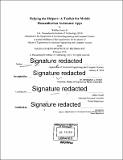Helping the helpers : a toolkit for mobile humanitarian assistance apps
Author(s)
Li, WeiHua James
DownloadFull printable version (10.87Mb)
Alternative title
Toolkit for mobile humanitarian assistance apps
Other Contributors
Massachusetts Institute of Technology. Department of Electrical Engineering and Computer Science.
Advisor
Lalana Kagal and Hal Abelson.
Terms of use
Metadata
Show full item recordAbstract
My research investigates the following question - How can relief workers be empowered to create useful mobile apps to support the work of first responder teams? Mobile devices are reshaping the disaster management domain and they make fast and targeted support possible. However there is the major obstacle of relief workers and volunteers often lacking the technical abilities to build and deploy the right mobile app in response to a particular disaster. In addition, data interoperability is often missing in many of the applications since they were developed without any prior agreement on the data schema. Linked Data technology solves the data interoperability problem by defining a method of publishing structured data and these structured data can be interlinked and become more useful. In order to explore and provide a solution to the gap between the knowledge of the relief workers and volunteers and the technical abilities needed to create an app, I conducted a participatory design workshop with the people at the International Committee of Red Cross and developed two mobile applications with one of the project managers there. In addition, I have created a Do-It-Yourself (DIY) toolkit that includes: (1) a Mobile Linked Data App Kit: a streamlined process for creating mobile apps and (2) an app-building methodology: a set of principles for relief workers to follow while creating apps using the toolkit. The Mobile Linked Data App Kit has the Punya framework, the Linked Data Form Extension, and the Virtuoso Docker container. The Punya framework is a DIY app-building platform utilizing drag-drop visual blocks to create new mobile applications. It includes Linked Data technology. The framework supports many Linked Data features. One of them is the ability to interoperate with different data sources needed for humanitarian assistance. Linked Data form is a critical part of data interoperability in the Linked Data technology. The Linked Data Form Extension is a tool implemented as an extension to the Punya framework that automatically generates Linked Data forms for Punya mobile apps. Linked Data needs to be saved at the triplestore and Virtuoso is one of the leading providers for Linked Data triplestore. The Virtuoso Docker container makes it possible to set up an instance of the Virtuoso Linked Data store in minutes with a few simple commands. These automated steps relieve developers the burden of manually creating them. The app-building methodology is for relief workers to follow while creating mobile apps. The goal of this toolkit is to enable aid workers to create vital and necessary mobile apps and to empower the humanitarian community. User testing of the framework with first responders has shown that the idea of "using, modifying, and creating" an app is greatly favored by our participants, that mobile Linked Data applications can aid humanitarian organizations by increasing their impact and effectiveness, and that humanitarian workers can successfully develop and deploy mobile applications by using this toolkit.
Description
Thesis: M. Eng., Massachusetts Institute of Technology, Department of Electrical Engineering and Computer Science, 2016. Cataloged from PDF version of thesis. Includes bibliographical references (pages 105-108).
Date issued
2016Department
Massachusetts Institute of Technology. Department of Electrical Engineering and Computer SciencePublisher
Massachusetts Institute of Technology
Keywords
Electrical Engineering and Computer Science.